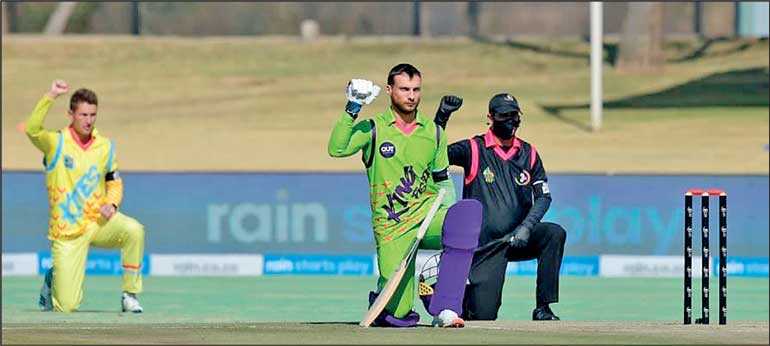Thursday Feb 19, 2026
Thursday Feb 19, 2026
Wednesday, 23 December 2020 00:00 - - {{hitsCtrl.values.hits}}

CSA’s exhibition 3TC game in July began with all players and support staff involved taking a knee - Getty Images
ESPNcricinfo: Cricket South Africa’s interim board has expressed concern over the men’s national team’s response to the Black Lives Matter (BLM) movement but maintains it will not compel the squad to act in a particular way. Instead, board chairman Judge Zak Yacoob has written to director of cricket Graeme Smith and national coach Mark Boucher noting individuals’ right to freedom of expression but stating he felt that South Africans should show “the world that all of us are together in opposing racism at every turn”.
Yacoob has also made himself available for any player who felt strongly about demonstrating the message of anti-racism to contact him directly and stressed the interim board’s stance in favour of BLM.
“The interim board (IB) reaffirmed the significance of the current worldwide movement against systemic racism in sport, noting that it was not a sectarian political cause but a broad social justice campaign garnering wide support from athletes all over the world, bringing together a coalition of support across national, racial, class, religious and generational lines,” an interim board statement read. “The IB feels black lives matter has a particular meaning given South Africa’s apartheid past. Therefore, the IB has confirmed CSA’s support for BLM – first expressed on 9 July in the aftermath of the letter sent to CSA by 36 former national players and senior coaches.”
While CSA as an organisation and individual players such as Kagiso Rabada have repeatedly thrown their weight behind the BLM movement, the national team, as a collective, has not been as strong in its stance. The team did not take a knee on its return to international cricket, against England, on 27 November – the first time they played together since March – but wore black armbands to mourn the lives lost in the coronavirus pandemic. Two days before the game the team issued a statement expressing their commitment to dismantling anti-racism by “building commitments to one another and demonstrating ways of engaging that we simply never have before as a team”.
In that statement, the team harked back to the exhibition 3TeamCricket (3TC) game in July, where all 24 players and every member of support staff involved took a knee. Coach Mark Boucher said that in that act the team felt “we have done what we needed to do”. The team then U-turned slightly on that and a banner reading: “We stand in solidarity against racism and gender-based violence” was on display in the stands at Newlands when they played England in two of the three T20Is. The third match was in Paarl and the banner was not transported to Boland Park.
Between July and November, CSA also set-up a Social Justice and Nation-Building (SJN) Committee, chaired by former independent board director Eugenia Kula-Ameyaw.
The committee had a vast range of responsibilities, which included considering reparations for those players who had been discriminated against in the past. An ombudsman, advocate Dumisa Ntsebeza, was unveiled in August and tasked with managing an independent complaints system. That process, along with the entire SJN, has been placed on hold while the interim board obtains a legal opinion on how to move forward.